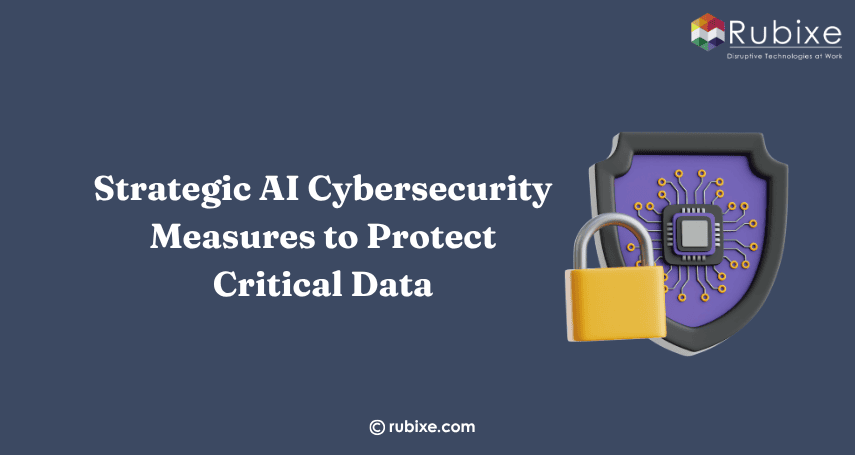Strategic AI Cybersecurity Measures to Protect Critical Data

AI cybersecurity in business is becoming a necessary part of any serious digital protection plan. As someone focused on security, I’ve seen how artificial intelligence transforms how we approach and manage cyber risks. The rise of digital platforms means organizations are facing increasingly complex threats that traditional tools can’t always catch. This is where AI cybersecurity truly proves its value.
Understanding AI Cybersecurity
AI cybersecurity refers to the use of artificial intelligence techniques like machine learning, natural language processing, and behavioral analytics to identify and respond to cyber threats. Unlike traditional systems that follow a fixed set of rules, AI can adapt based on new information, making it well-suited for today’s evolving threats.
The Need for AI Cybersecurity
With the growing complexity and volume of cyber threats, traditional security tools are no longer enough. AI cybersecurity plays a vital role in modernizing digital defense. It enables systems to analyze, learn, and respond to attacks more intelligently and efficiently.
Why AI cybersecurity matters:
-
Real-Time Detection and Response: AI cybersecurity tools can identify and mitigate threats as they happen, minimizing potential damage
-
Scalability for Big Data: These systems handle massive volumes of security logs and user behavior data without delay
-
Proactive Threat Prevention: AI cybersecurity solutions predict and block suspicious activity before it escalates
-
Continuous Learning: With exposure to more threat data, AI systems improve over time, becoming more accurate and reliable
-
Cross-Industry Protection: From finance to healthcare, AI cybersecurity provides tailored protection against evolving digital risks
Key AI Cybersecurity Strategies
-
Threat Detection and Prevention
AI algorithms scan network traffic and user behavior to detect anomalies. They recognize patterns that might go unnoticed by human eyes. With AI cybersecurity, it's easier to identify suspicious actions, such as unusual login attempts or unexpected data transfers. -
Automated Incident Response
Speed is essential in cybersecurity. AI services provide tools that can immediately isolate a threat, shut down access points, or notify the security team. This reduces the damage and shortens the response time. -
Predictive Analytics
Machine learning models within AI cybersecurity solutions can forecast likely attack scenarios based on past behavior and current indicators. Businesses can proactively strengthen their defenses before a threat materializes. -
Behavioral Analysis
AI can build profiles of normal activity for users and systems. If behavior shifts—for example, a user suddenly accessing large volumes of data outside business hours—AI alerts the security team or blocks the activity. -
Real-Time Monitoring and Alerts
AI cybersecurity systems operate 24/7 without fatigue. They monitor servers, databases, and endpoints for unusual activity and send instant alerts to teams. AI consulting services help fine-tune these systems to match specific organizational needs.
Role of AI Consulting in Cybersecurity
AI consulting plays a critical role in helping organizations implement intelligent, adaptive, and future-ready cybersecurity strategies. Instead of one-size-fits-all solutions, AI consultants tailor systems to meet unique risks, infrastructure, and compliance needs.
How AI consulting supports cybersecurity:
-
Strategic Planning: Aligns AI-driven security solutions with business goals and risk profiles
-
Threat Detection Integration: Helps implement tools that identify abnormal patterns and behaviors in real time
-
Custom Model Development: Builds machine learning models to detect specific threats relevant to the organization
-
Compliance & Governance: Ensures security solutions meet regulations such as GDPR, HIPAA, or ISO standards
-
Training & Change Management: Guides teams in adopting AI cybersecurity tools and improving awareness across the organization
Integration with Existing Systems
For AI cybersecurity to be effective, it must work seamlessly with your current tools, platforms, and workflows. AI consulting helps ensure that security enhancements don’t disrupt operations but instead strengthen your existing infrastructure.
How AI integrates with your systems:
-
API Compatibility: Ensures new AI tools communicate effectively with legacy systems and third-party platforms
-
SIEM Integration: Connects with security information and event management tools for better incident tracking
-
Cloud & On-Premise Support: Aligns AI solutions with both cloud-based and traditional IT environments
-
Data Flow Management: Maintains secure, structured data exchange between systems to improve threat detection
-
Minimal Downtime Deployment: Ensures upgrades and installations are timed to reduce operational disruption
Cost-Efficiency and Scalability
AI cybersecurity solutions can scale with your business. Whether you’re a startup or a large enterprise, AI systems adjust to different volumes of data and activity. By reducing the need for manual monitoring and repetitive tasks, AI services also help cut operational costs.
Challenges in Implementing AI Cybersecurity
While AI cybersecurity brings advanced protection, adopting it isn't without its hurdles. Businesses must address technical, strategic, and ethical challenges to ensure successful implementation.
Common challenges include:
-
Data Quality and Availability: AI models require clean, labeled, and diverse data to learn effectively
-
Integration Complexity: Merging AI tools with legacy infrastructure can be time-consuming and costly
-
High Initial Investment: Advanced AI solutions often come with a steep setup cost and require skilled personnel
-
False Positives: Over-sensitive models may trigger too many alerts, leading to alert fatigue
-
Skill Gaps: Organizations may lack in-house talent to manage and fine-tune AI cybersecurity systems
-
Ethical and Legal Risks: Ensuring compliance with data privacy regulations like GDPR while training AI models
-
Evolving Threats: AI must continuously adapt to sophisticated and ever-changing cyber threats
AI cybersecurity is no longer optional. It's a vital part of securing critical data and maintaining trust. Through strategies like threat detection, behavioral analysis, and automated response, AI helps build stronger, faster, and smarter defenses. With support from AI consulting with the right AI services like Rubixe, businesses can stay resilient and prepared in an increasingly digital world.
- Art
- Causes
- Crafts
- Dance
- Drinks
- Film
- Fitness
- Food
- Games
- Gardening
- Health
- Home
- Literature
- Music
- Networking
- Other
- Party
- Religion
- Shopping
- Sports
- Theater
- Wellness


